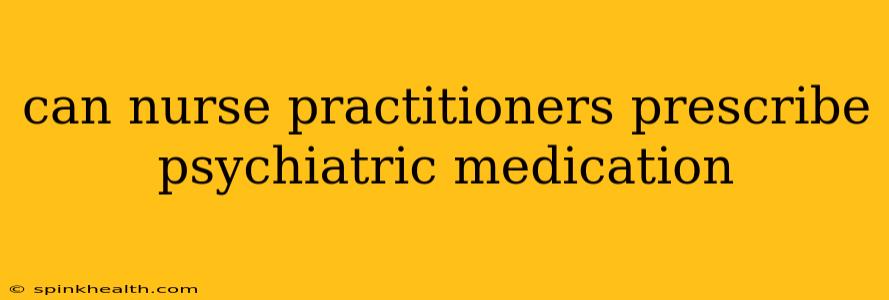Can Nurse Practitioners Prescribe Psychiatric Medication? The Expanding Role of NPs in Mental Healthcare
The question of whether nurse practitioners (NPs) can prescribe psychiatric medication is a nuanced one, varying significantly depending on location and specific regulations. It's not a simple yes or no answer, and the landscape is constantly evolving. Let's delve into the complexities of this crucial aspect of healthcare access.
My journey into understanding this topic began with a conversation with a friend whose family member struggled to find a psychiatrist. The wait times were agonizing, and the limited availability of mental health professionals in their rural area felt like a cruel twist of fate. This experience highlighted a critical issue: the shortage of mental healthcare providers, and the crucial role NPs could play in addressing this.
The core issue lies in the differences in state regulations regarding prescriptive authority. Some states grant NPs full prescriptive authority across all medication classes, including psychiatric medications, after they complete their education and meet specified requirements. Other states have restrictions, limiting the types of medications NPs can prescribe or requiring collaboration with a physician. And in some states, the landscape is even more intricate, with varying rules for different practice settings (e.g., rural vs. urban).
What are the Requirements for NPs to Prescribe Psychiatric Medications?
This is a key question, and the answer hinges heavily on individual state laws. However, several common threads weave through most licensing boards' requirements:
- Graduation from an accredited Nurse Practitioner program: This is the foundational requirement, ensuring a solid base of nursing and advanced practice knowledge.
- Successful completion of a national certification exam: This demonstrates competency in advanced nursing practice and often includes a specific focus on psychiatric-mental health.
- Completion of supervised clinical practice hours: Practical experience under the guidance of experienced professionals is crucial for honing clinical skills, especially in the sensitive realm of psychopharmacology.
- Compliance with state-specific regulations: These can vary drastically, impacting everything from continuing education requirements to the specific collaborative practice agreements needed.
It's vital to consult your state's Board of Nursing website for the most up-to-date and precise information regarding specific requirements for prescribing psychiatric medications.
What types of Psychiatric Medications can NPs Prescribe?
Again, this depends heavily on state regulations. However, in states with full prescriptive authority, NPs can typically prescribe a wide range of psychiatric medications, including:
- Antidepressants: SSRIs, SNRIs, TCAs, MAOIs
- Antipsychotics: First-generation and second-generation antipsychotics
- Mood stabilizers: Lithium, valproate, lamotrigine
- Anxiolytics: Benzodiazepines (often with restrictions), buspirone
However, even in states with full prescriptive authority, there may be limitations on prescribing controlled substances, requiring additional certifications or protocols.
Do all NPs Prescribe Psychiatric Medications?
No, not all NPs specialize in mental health. While many NPs are trained and licensed to prescribe psychiatric medications, it's crucial to confirm a provider's qualifications and experience in this area before seeking treatment.
How can I find an NP who prescribes psychiatric medication?
To find an NP who can prescribe psychiatric medications, you can:
- Contact your state's Board of Nursing: They can provide a list of licensed NPs in your area.
- Use online search engines: Specify "psychiatric nurse practitioner" in your search to filter results.
- Check with your primary care physician: Your PCP may have referrals to appropriate specialists.
The increased role of NPs in providing mental healthcare is a crucial development in addressing the ongoing shortage of mental health professionals. However, it's paramount to understand the variability in state regulations and to verify a provider's qualifications before seeking treatment. Understanding the intricacies of prescriptive authority for NPs empowers patients to actively participate in their care and navigate the evolving landscape of mental health services.

